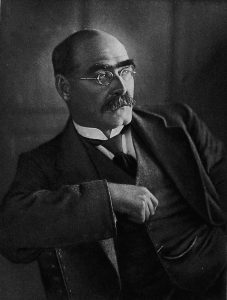48 Biography: Rudyard Kipling

Portrait of Rudyard Kipling
Artist | Unknown Source | Wikimedia Commons License | Public Domain
RUDYARD KIPLING
(1865-1936)
Born in India where his father taught architecture in Bombay (now Mumbai), Rudyard Kipling always viewed his childhood there as idyllic. In contrast, he always viewed his introduction (even indoctrination) to “superior” British society—by being boarded out for six years to a sea captain living in Southsea—as desolating. Seemingly abandoned by his parents, Kipling was left to the less than tender care of the captain’s widow. He found consolation, however, in the company of his uncle, Edward Burne-Jones (1833-1898), the Pre-Raphaelite painter and friend of William Morris. His artistic tastes and knowledge were honed by the readings, games, and story-telling he enjoyed with Burne-Jones’s family.
Equally agreeable was his studying at the United Services College, whose headmaster Cormell Price was a friend of both Burne-Jones and Morris and whose radical precepts fostered Kipling’s interest in poetry. Not expected to qualify for a scholarship at Oxford, Kipling was provided a position—through his parents’ connections—as reporter for the Civil and Military Gazette in Lahore, where his father then worked as a museum curator.
His reporting gave him insights to Anglo-Indian society, British colonial administration, British military life, and Indian culture. His extraordinary creativity
and energy led to his regularly publishing stories in the Gazette that he published in volume form as Soldiers Three (1888). While depicting rugged “masculinity” and adventures, these stories also revealed general human failings and vices that occurred across races. Promoted to a senior paper, The Pioneer, Kipling’s exposes and commentaries evoked considerable backlash and complaint, to the point that Kipling returned to England, where he soon won a place in English letters with his The Courting of Dinah Shadd and Other Stories (1890), The Light That Failed (1891), and Barrack-Room Ballads and Other Verses (1892).
In 1892, Kipling married Caroline Balestier, his agent’s sister. Her family connections in Vermont led the couple to settle in Dummerston, Vermont where they had Naulakha built, a home somewhat reminiscent of an Indian bungalow. There Kipling wrote The Jungle Book (1894), Captains Courageous (1897), and The Day’s Work (1898). Family disputes caused the couple to return to England in 1897, the year of Queen Victoria’s Jubilee. His writing then gave sometimes nuanced, sometimes jingoistic voice to the last hurrah of British Imperialism, including Cecil Rhodes’s (1853—1902) extremely problematic—and ultimately unsuccessful—empire-building in South Africa. Like so many others in England, the Kiplings suffered loss in WWI with the death of their son John. Kipling’s subsequent activities in the first decades of the twentieth century focused on emotional recovery from the war.
Kipling’s diverse literary output—poetry, short stories, essays, novels, and autobiography—may on the whole reveal the worse of British racial bias, Western prejudice, and political conservatism. Yet they also reveal his concern with the individual within the larger social system, even when he over-relied on such systems. “The Man Who Would Be King” recounts the “might-makes-right” power-grabbing of two adventurers, Daniel Dravot and Peachey Carnehan who intrepidly go away to be kings. They exploit so-called native superstition that views these two men as gods. And they call attention to the apparent whiteness of the Kafirs they dominate as a positive. Yet their story references the Masonic brotherhood, a group that Kipling upheld as ideally (if not actually) a brotherhood of all humankind— “prince” or “beggar” regardless of race. And Carnahan undergoes Christ-like punishment and penance. The crown (and head) he carries at the end of the book disappears, as though it’s a passing on of the baton.
This material is from British Literature II: Romantic Era to the Twentieth Century and Beyond by Bonnie J. Robinson from the University System of Georgia, which is licensed under a Creative Commons Attribution-ShareAlike 4.0 International License.
This license allows you to remix, tweak, and build upon this work, even commercially, as long as you credit this original source for the creation and license the new creation under identical terms.
